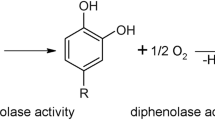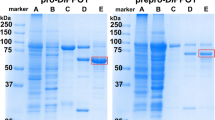Abstract
DURING the enzymic oxidation of catechol, approximately two atoms of oxygen are taken up for each molecule of catechol, whereas only one atom is required for oxidation to the o-quinone stage. Wagreich and Nelson1 consider this extra uptake to be accounted for by the interaction of the o-benz-quinone with water to form 1 : 2 : 4-trihydroxy-benzene, which then reacts with a further molecule of o-benzquinone to produce hydroxy o-quinone and a molecule of catechol. Their evidence that a poly-phenol is produced from o-benzquinone, capable of being oxidized to an o-quinone by tyrosinase, is convincing. That the polyphenol produced is identical with catechol cannot be taken as established. The scheme has also been strongly criticized by Wright and Mason2.
This is a preview of subscription content, access via your institution
Access options
Subscribe to this journal
Receive 51 print issues and online access
$199.00 per year
only $3.90 per issue
Buy this article
- Purchase on Springer Link
- Instant access to full article PDF
Prices may be subject to local taxes which are calculated during checkout
Similar content being viewed by others
References
Wagreich, H., and Nelson, J. M., J. Amer. Chem. Soc., 60, 1545 (1938).
Wright, C. I., and Mason, H. S., J. Biol. Chem., 165, 45 (1946).
Author information
Authors and Affiliations
Rights and permissions
About this article
Cite this article
ROBERTS, E., WOOD, D. Oxidation of Catechol by Tea-Oxidase. Nature 165, 32–33 (1950). https://doi.org/10.1038/165032b0
Issue Date:
DOI: https://doi.org/10.1038/165032b0
Comments
By submitting a comment you agree to abide by our Terms and Community Guidelines. If you find something abusive or that does not comply with our terms or guidelines please flag it as inappropriate.



